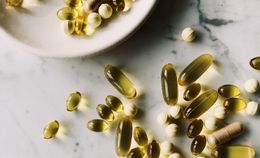Everyone talks about eating yogurt and the good bacteria it possesses for the digestive system. But all bacteria is not good for the digestive system. What happens when there is bacterial overgrowth in the small intestine? To answer that question, we have created this guide on SIBO. Our aim is to help you understand the condition, and how to treat it.
Let's get started . . .
What is SIBO?
Small intestinal bacterial overgrowth or SIBO is a condition where there is too much bacteria in your small intestine. Bacteria is always present in your digestive tract and is a normal, healthy part of your digestive system. However, an excess of bacteria in your small intestine can damage your health.
Specifically, SIBO occurs when bacteria from other parts of your digestive tract colonize your small intestine. These bacteria are beneficial but meant to live in your large intestine, also known as the colon. The small intestine normally has much lower levels (and different strains) of bacteria living in it. When bacteria from your colon moves into your small intestine, they can interfere with your digestive process and cause a number of unpleasant symptoms.
An overgrowth of bacteria in the small intestine can make it difficult to properly digest and absorb food.
The walls of the small intestine are meant to soak up nutrients from what we eat - but they can't do that if they are covered with too much bacteria.
The key problem with SIBO is that certain bacteria are growing in greater numbers and higher up in your digestive tract than they should be. In a healthy digestive tract, the small intestine has low levels of bacteria and is essentially self-cleaning - the muscles of the small intestine move food along towards the large intestine, sweeping back any bacteria that may be coming in from the large intestine at the same time. However, for people with SIBO, that process is often not working properly. The small intestine is unable to function as it should, and excess bacteria flourish instead of being cleared out.
How is SIBO Diagnosed?
What is a SIBO test for? This is a question that is often asked when trying to understand how SIBO is diagnosed. Testing for SIBO typically starts with what is called a lactulose breath test.
A breath test is ordered by a doctor and involves collecting samples of your breath over a three-hour period while you eat specific amounts of sugar during that time.
The sugar stimulates the bacteria in your gut to produce gas, which is then released and collected when you exhale. The exact levels of gas can help give your doctor a clearer picture of what is going on with the bacteria in your gut.
Some doctors may also use stool samples to examine your gut. These can be very useful, however, they are less conclusive than a breath test for detecting SIBO.
4 Serious Complications of SIBO
Many people ask, what happens if SIBO is left untreated? The truth is, if you have SIBO, and you do not treat it, you may find yourself experiencing one or more of the following four serious complications:
1. Central nervous system damage
2. Damage to the brain
3. Irritable bowel syndrome (IBS)
4. Leaky gut syndrome
What are the Symptoms of SIBO?
If you are experiencing chronic abdominal pain and regular diarrhea after eating, a gut problem like SIBO may be the cause. Specific symptoms of SIBO include:
1. Abdominal pain
2. Vomiting
3. Nausea
4. Diarrhea
5. Bloating
6. Distended stomach
7. Flatulence
8. Lack of energy or exhaustion
9. Weight loss
10. Difficulty absorbing food
11. Vitamin and nutrient deficiency, including B12
12. Rosacea (red blotches on your skin)
14. Eczema
SIBO can also occasionally cause constipation, instead of diarrhea.
Because gut health and digestion is so important to your overall wellness, gut problems tend to affect other aspects of your health significantly.
Let's find out what other conditions are a result of SIBO . . .
13 Conditions that can Stem from SIBO
SIBO can be the leading cause and root of ten other conditions. When SIBO is treated and healing occurs, the other conditions and their symptoms have an increased chance of also improving. Here is a list of those ten connected conditions to SIBO:
3. Depression
4. Anxiety
5. Chronic Fatigue
6. Fibromyalgia
8. Autoimmune disorders
9. B12 deficiency
10. Chronic malnourishment
11. Celiac disease
12. Crohn's disease
13. Diabetes
What are the Causes of SIBO?
There are a number of factors that can contribute to a person developing SIBO. However, not everyone has all of these factors - in other words, several different combinations of underlying conditions can lead to SIBO. Potential causes of SIBO include physical, medications, diet, genetic, and emotional causes. Let's find out more about each of these causes of SIBO.
Emotional Causes of SIBO
A direct connection specifically between SIBO and emotional health has not been heavily researched.
However, emotional stress or pain directly impacts your gut. Your gut is closely connected to your brain and central nervous system - when people feel stressed out or painful emotions, they often experience those feelings as physical sensations in the gut.
The gut-brain relationship goes both ways. Over two-thirds of the neurotransmitters that support your mood and make you feel good, like dopamine and serotonin, are actually manufactured in your gut before moving up to your brain. This is part of why people with gut disorders often experience shifts in mood and struggle with issues in depression.
Chronic emotional stress can be a factor in a myriad of gut problems. Stress can cause the gut to largely shut down in order to conserve resources as a part of the body's fight, flight or freeze response. Over time, this slowed digestive process can create an environment conducive to the development of SIBO.
SIBO and Aging
People over 60 years old are much more likely to be diagnosed with SIBO than younger people. A comprehensive review confirmed the connection between that aging plays a role in SIBO. The following statistics were identified using a glucose breath test found that:
- Disabled older adults have SIBO: 33%
- Older, non hospitalized adults have SIBO: 15.6%
This is likely because of a combination of the following four factors:
1. The digestive system naturally slows with age
2. Changes in how the gut immune system functions
3. The development of new conditions like diabetes
4. Changes in what is eaten that can lead to malnutrition
Medications and SIBO
Taking certain medications can be a causal factor for SIBO. Here is a list of three different types of medications that can cause SIBO and why:
Antibiotics: Especially if taken regularly, can disrupt your natural balance of gut bacteria, leading to an overgrowth of the wrong strains in the wrong places.
Anti-inflammatories: Ibuprofen or Advil, steroids, and immunosuppressants can damage the lining of your gut, and may also encourage the development of SIBO.
Acid-blockers: Like proton-pump inhibitors decrease your production of stomach acid, which makes it easier for SIBO to occur.
Genetic Causes of SIBO
There is no specific gene or group of genes that cause SIBO. It is likely that genetics play some role in establishing the underlying conditions that lead to SIBO. However, that role is not conclusively defined.
5 Physical Causes of SIBO
Structural problems or abnormalities in the gut are one of the major causes of SIBO. These include:
- Damage to the muscles or nerve endings in the small intestine
- Diverticulitis (small pouches that form on the lining of your digestive system)
- Scarring from surgery or injury
- Blind loop syndrome (a condition where food bypasses part of the small intestine)
- Inflammation
Any of these conditions can impede the digestive process, causing food to move too slowly through the small intestine, which gives bacteria extra time to colonize and grow.
Diet
Diet can also be a major factor in SIBO. Some foods when they breakdown in the body, the food turns into sugar. This leads to unhealthy bacteria being put into the body. Here is a list of foods that turn into sugar during digestion:
- Sugar
- Alcohol
- Processed carbohydrates
Although diet can be a cause of SIBO, diet can also play a large role and healing from SIBO. Let's look at how diets for SIBO and how they can help along with five other methods that can be helpful to those living with SIBO.
How Can I Treat SIBO Naturally?
Many people wonder and ask the following two questions:
1. Is SIBO curable? The condition SIBO is treatable. Different treatment options can lead to a person being cured of SIBO. However, it is important to point out that once SIBO is resolved it can come back and reoccur.
2. How can I treat SIBO Naturally? Yes, and we're going to share more about that next...
What is the Treatment for SIBO?
SIBO is a treatable condition. As with many gut health conditions, a natural SIBO treatment approach typically involves a combination of dietary changes, herbal supplements, and probiotics. It is also important to do what you can to lower your stress levels.
Healing SIBO naturally or holistically typically involves a multifaceted approach. This may involve:
- Dietary changes
- Supplements
- Vitamins
- Probiotics
- Anti-microbial herbs
- Incorporating lifestyle changes to reduce your stress levels
Antibiotics are commonly used to treat SIBO, however, they should always be taken in conjunction with a comprehensive program to rebuild and restore your gut functioning.
Is Natural and Herbal Treatment of SIBO Effective?
A study published by the Global Advances in Health and Medicine researched whether the remission rate of SIBO when using either the SIBO prevalent antibiotic rifaximin or herbs and an herbal treatment.
Information about the study:
Patients: 104 people diagnosed recently with SIBO
Time frame: 4 weeks
Treatment offered: Rifaximin 1200 mg daily or herbal therapy
Wondering what the results were from the study? It was found that the herb therapy was equally effective in placing a person's SIBO into a state of remission. The percentages of participants who went into remission from SIBO were:
Herbal therapy: 46%
Rifaximin Antibiotic therapy: 34%
Nutrition and SIBO
Herbs and herbal supplements are at the center of treating SIBO naturally. However, diet is also important. Because everything you eat goes straight to your gut, what you put in your mouth directly affects your gut health. Figuring out what foods and supplements you need to support your gut health is an important part of the healing process.
3 Diets for SIBO
Most experts agree finding the right diet is one of the keys to treating SIBO. However, there is disagreement over what that diet should look like, and consequently, there are several different dietary protocols that may be recommended.
These are usually elimination diets that require you to stop eating certain foods - including virtually all carbohydrates, gluten, alcohol, processed foods and sweeteners, as well as most forms of dairy and many fruits - that SIBO bacteria feed on. However, different elimination diets may focus on different problem foods.
Here is a list of three specific examples of SIBO diets:
- Low-FODMAPS diet: Is short for Fermentable Oligo-, Di-, Mono-saccharides And Polyols
- GAPS diet: Is an acronym for gut and psychology syndrome diet
- SCD Diet: Stands for the specific carbohydrate diet
Each of these three diets are far more than acronyms. Each has foods that are recommended for eating and foods that are not recommended. Wanting for more information on SIBO diet options? Wondering how you can menu plan to include SIBO friendly recipes?
SIBO Diets and Time Frames
Whatever the diet, experts typically recommend that you only follow it for a few (under six) months. That's enough time to help starve the problem bacteria in your gut. Any longer, and you actually end up killing off the healthy gut bacteria that you need, seriously damaging your intestinal health.
After a few months on a SIBO diet, gently and gradually re-introduce healthy carbohydrates. This will preserve the gains you've made and nurture your healthy gut bacteria.
Supplements and SIBO Treatment
Herbal remedies are essential to a holistic SIBO treatment approach.
Studies have found that anti-microbial herbs are at least as effective as antibiotics at eliminating SIBO, without the side effects and long-term gut health risks that come with taking antibiotics.
There are proprietary blends of herbs available, and your holistic physician can help you determine the best option.
There are six food-grade essential oils that can be taken independently or with other supplements and treatment plans for SIBO. The six essential oils are:
1. Oregano
2. Peppermint
3. Frankincense
4. Clove
5. Thyme
6. Tarragon
Experts recommend taking a drop or two mixed with water before eating. These can help relieve symptoms and eliminate unhealthy gut bacteria.
Allicin extract has also been found to be effective. Allicin is an antimicrobial chemical that occurs naturally in garlic. However, because experts often recommend that people with SIBO avoid garlic, allicin may be purchased in a SIBO-safe capsule form.
Vitamins for SIBO
Vitamins can be added to your daily regimen of treatment for SIBO. Wondering which vitamins to consider?
1. B12
2. Zinc
3. Glutamine
4. Iron
Taking probiotics is critical, as this can help rebalance bacteria levels in your gut. Probiotics are also essential if you have taken antibiotics to treat SIBO, as this destroys the healthy bacteria in your gut along with the bad.
Herbal prokinetics, which stimulate the muscles of your digestive system, are highly recommended for several months following herbal or antibiotic treatment.
A holistic doctor or nutritionist can help you explore the right diet and combination of supplements and vitamins for you and your body.
Lifestyle Changes to Help with SIBO
Experts often recommend lifestyle changes to help treat SIBO. These are typically focused on helping you to reduce your stress and feel more calm and relaxed. Doing so can significantly improve your gut health.
Exercise: Lowers your stress levels, and releases feel-good endorphins that can help counteract any SIBO-related depression you may be experiencing.
Sleep: Getting enough sleep is very important to maintain a healthy immune system and help your body naturally fight off stress.
Three other proven methods of stress reduction that can you can use are:
Mind-body techniques like:
- Tai Chi
If you have any major emotional stressors, you can also consider working with a therapist or a counselor to help process and resolve them.
What Type of Practitioner Should I See to Treat SIBO Naturally?
There are four different types of practitioners that you could go see when seeing natural treatment for SIBO. You could choose to just see one type of the practitioners or combine the different types for a treatment plan that best serves you, and what you are comfortable. Here is a list of the types of practitioners:
1. Holistic physicians
Naturopathic, integrative or functional medicine often have a strong understanding of gut disorders, and are a good choice to help you treat SIBO. They can recommend a natural SIBO treatment plan based on herbal supplements and dietary changes (or more traditional approaches like antibiotics, if you prefer). A holistic doctor can also help you explore underlying factors that may have contributed to you developing SIBO.
2. Nutritionist
Can help you establish an eating plan for treating SIBO and find the right diet, and combination of supplements and vitamins for your body.
3. Acupuncture
Can be useful in treating mood imbalances resulting from disruption to your gut.
4. Hydrotherapy
Can also help clean out your gut and improve your overall gut health, even though the treatment does not directly affect your small intestine but your colon.
References:
Herbal Therapy Is Equivalent to Rifaximin for the ... (n.d.). Retrieved November 11, 2018, from https://www.ncbi.nlm.nih.gov/pmc/articles/PMC4030608/
Small Intestinal Bacterial Overgrowth - PubMed Central (PMC). (n.d.). Retrieved November 11, 2018, from https://www.ncbi.nlm.nih.gov/pmc/articles/PMC3099351/





















